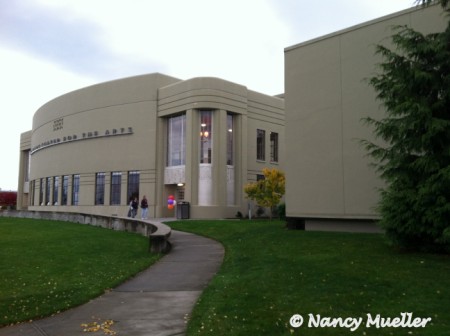
I’m spending the day in Edmonds, Washington to attend a free European Travel Festival (“Teach-A-Thon”) hosted by travel expert Rick Steves and and his Europe Through the Back Door team to kick off their 2013 tour season. With 10 classes to choose from – ranging from Steves’ session on “Travel Skills” to “Packing Light & Right”, from “1000 Years of European Art & History” to country-specific information, here are a few travel tips I picked up along the way:
 Rick Steves
Rick Steves
To get off the beaten path and away from the tourist crowds . . .
- Tour the most popular sights early in the morning or in the late afternoon. Then plan to spend the night.
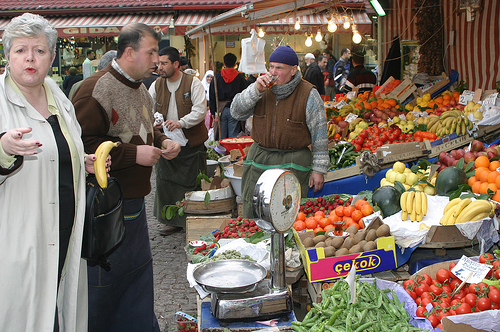
- Get into the markets. Buy something even if you’re not hungry. Talk to people.
- Go to local sports events. You’ll learn local swear words (but be sure you’re wearing the right [team] colors).
- Think of the cruise ships or buses as your base and then go off on your own. Be independent in the context of the big tour operators. Get out and stroll and meet people. Travel is about connecting with people.
- “There are two IQs of European travelers: those who wait in line and those who don’t. If you’re waiting in lines, you’re screwing up.” For example, go to Versailles any day but Tuesday when the museums are closed because that’s when all the tourists head to Versailles.
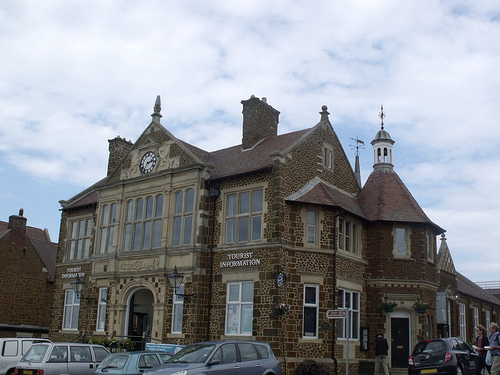
Tourist Information Office in Hunstanton, photo by Ell Brown, courtesy of Flickr
To find out what your options are at your destination . . .
- Look at TripAdvisor for sightseeing, tours and entertainment possibilities.
- “The first place I stop is the Tourist Information Office no matter how well I know a town. I can find out what’s going on this week and get free passes.”
- Guided tours sponsored by the local tourist office are always time and money well spent.
- If you use a local tour guide, you’ll have much more value in your sightseeing trip. Prices can range from $200. for half a day in the most expensive cities like London to $100. a day with a car in less expensive countries like Poland.
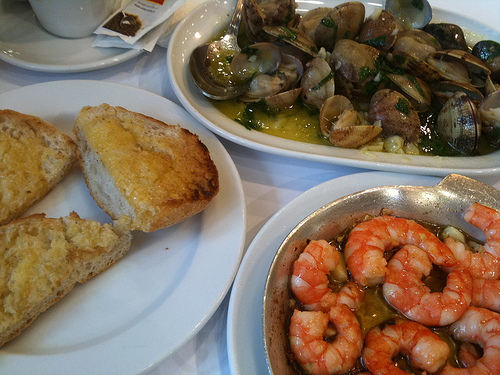
Ramiro’s in Lisbon, Portugal, photo by crystalmartel, courtesy of Flickr
To be an adventurous eater while minimizing the risk . . .
- Always order a different dish from your travel partner and share.
- Find places that specialize in local clients. You can tell if the menu’s handwritten in one language and not extensive which shows that it’s seasonal and changes daily.
- Ask the people in the tourism office where they go for lunch.
- Department store cafeterias or government subsidized cafeterias for workers are a relatively good bargain.
- “Eat in a good restaurant but eat sparingly. Share small plates.” Have a salad and a glass of wine, tapas, or antipasto spreads.
- Pick up food at a local market and have a picnic.
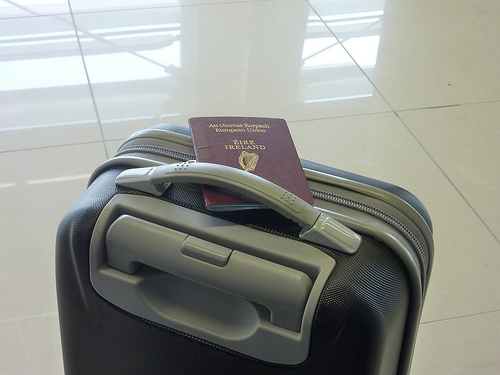
Passport and Luggage, photo by Sean MacEntee, courtesy of Flickr
On packing light . . .
- “If there’s one thing you can take home that translates to travel happiness, it’s to pack light.”
- You want to be mobile.
- Only take carry on bags.
On accommodations . . .
- “The more you spend, the higher the wall you build between you and what you came to see.”
- When you stay in a B & B, you have a friend, and as a bonus, you get your own local mother. You don’t have to, but you can.
- Smaller towns also have hostels, not just for younger travelers.
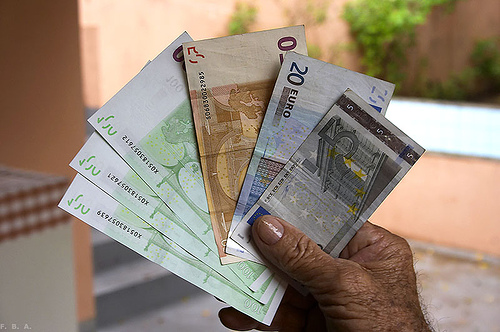
Euros, photo by patola, courtesy of Flickr
On money . . .
- You will have more versatility if you get a credit card with a chip in it. Ask for one at your local bank.
- Flights within Europe have come down in cost. Investigate pricing of air travel before taking the train or bus.
- “Wear a money belt tucked inside your shirt for security.”
The bottom line . . .
“If you expect yourself to travel smart and you’re equipped with good information, you can travel like a pro.”
For travel writing advice from Rick Steves, be sure to check out my earlier post here.
What are your favorite travel tips, Wanderboomers?
Thanks for this excellent info.
You’re welcome, Joanne! Thanks for stopping by ~
I can’t stress enough, travel out of season. Before Easter Holidays prices are so much cheaper and you will get the best hospitality. Try a company called “Holiday Lettings for apartment, villa rental.” They are all over Europe. We recently got a three bedroom penthouse Apartment in Pireaus, Athens, that sleeps up to eight for only E120 Euros a night.
Best time to go to Venice is in February when the Venetians come out to play.
Whenever I go to a new place in Europe the first thing I do is go to the local food market. This is the quickest way to ‘immerse’ yourself in with the locals. When in Croatia, by the time I had finished shopping for the morning, I was already full to the gills. Try and learn at least the basics of the language of each country you are going to visit, “Hello,” “Goodbye,” “Thank you,” and “Please.” It really will endear you. Happy Travelling.
Great tips, Christina! Thanks so much for taking the time to add to the list.